|
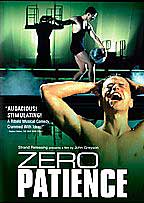
Zero
Patience
Strand
Releasing,
1993
Director/Screenplay:
John Grayson
Starring:
John Robinson, Norman Fauteux, Dianne Heaterington, Michael Callan
Unrated,
100 minutes
|
The
Politics Of Blame
by
Michael D. Klemm
Posted
online, August, 2007

In
the early 1990s, several comedic approaches to AIDS stories began to appear.
1993 was the year that Paul
Rudnick premiered his hit play Jeffery (filmed in 1995) and
Canadian experimental filmmaker John Grayson unleashed
Zero Patience on unsuspecting gay audiences.
I have admired Grayson
ever since first viewing his 1995 masterpiece, Lilies.
Lilies was a one-of-a-kind film that embraced its theatrical roots
(having stage legend Brent Carver in the film didn't hurt) to create its
own reality. In his earlier Zero Patience,
his sense of the surreal hits a raw nerve by using AIDS as the subject
of a political musical.
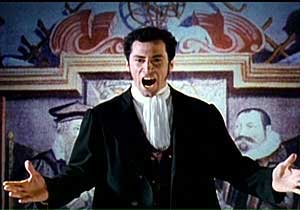 Yes,
you heard right. A musical. Even if you find that idea distasteful you
will be swept up in the marvelous absurdities of this film after a few
minutes. Remember how the best of all the 1960s atomic bomb films was
Stanley Kubrick's "nightmare comedy," Dr. Strangelove, Or How I Learned
To Stop Worrying And Love The Bomb? Laughter and satire can be powerful
tools in the right hands and, during the 1980s, Grayson cut his teeth
on a series of short ACT UP videos. Yes,
you heard right. A musical. Even if you find that idea distasteful you
will be swept up in the marvelous absurdities of this film after a few
minutes. Remember how the best of all the 1960s atomic bomb films was
Stanley Kubrick's "nightmare comedy," Dr. Strangelove, Or How I Learned
To Stop Worrying And Love The Bomb? Laughter and satire can be powerful
tools in the right hands and, during the 1980s, Grayson cut his teeth
on a series of short ACT UP videos.
Zero
Patience
begins with a bizarre anachronism: the famous explorer, Sir Richard Francis
Burton, is still alive and working as the chief taxidermist for the Toronto
Museum of Natural History. It seems that he did actually find the
Fountain of Youth back in the 1800s. Burton once shocked genteel London
with his translations of Tales Of 1,001 Arabian Nights and The
Kama Sutra, not to mention his studies of penis size in different
cultures. He is preparing "The Hall Of Contagion," an exhibit on plagues
throughout history. When a slashed budget denies him the "Dusseldorf Plague
Rat" (which would have been the "Shroud of Turin" of his collection),
he hits upon another idea: AIDS - using Patient Zero, the man who supposedly
brought the disease to North America, as its centerpiece.
|
|
 The
early 90s was a time of much agitprop in the first wave of the new queer
cinema. Zero Patience, as it
subverted musical conventions, was one of the most outrageous examples.
A group of ACT UP activists sing about their HIV status before breaking
into an elaborate production number about the greed of pharmaceutical
companies. A trio of naked men trill an a-capella number about "When you
pop a boner in the shower" to Burton, who is doing undercover research
in a gay bath house, his video camera doubling as his phallus. A stuffed
African monkey in the museum comes to life as a leather-clad lesbian to
demand, in song, why she is blamed for transmitting AIDS to humans. Finally,
the famed drag performer (and then-longtime AIDS survivor) Michael Callan
appears on a microscope slide as HIV herself to exonerate Patient Zero. The
early 90s was a time of much agitprop in the first wave of the new queer
cinema. Zero Patience, as it
subverted musical conventions, was one of the most outrageous examples.
A group of ACT UP activists sing about their HIV status before breaking
into an elaborate production number about the greed of pharmaceutical
companies. A trio of naked men trill an a-capella number about "When you
pop a boner in the shower" to Burton, who is doing undercover research
in a gay bath house, his video camera doubling as his phallus. A stuffed
African monkey in the museum comes to life as a leather-clad lesbian to
demand, in song, why she is blamed for transmitting AIDS to humans. Finally,
the famed drag performer (and then-longtime AIDS survivor) Michael Callan
appears on a microscope slide as HIV herself to exonerate Patient Zero.
The underlying theme
seems to be the dubious "art" of laying blame. Gaetan Dugas, the French
Canadian flight attendant who came to be known as "Patient Zero" is the
film's focal point. Due to a flawed cluster study, Randy Shilts, in his
extensively researched And The Band Played On (1987), blamed Dugas;
even suggesting that he deliberately spread the disease once he knew that
he was sick.
|
|
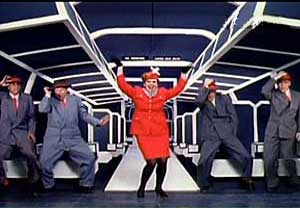 Zero
Patience
doesn't even refer to Dugas by name - the character is actually called
Patient Zero in the film. Instead Grayson revels in poking fun at all
the finger pointing. The monkey gave AIDS to humans, the media blames
gays, Haitians and drug users, ACT UP blames the drug companies. And Burton,
obsessed with blaming Patient Zero and depicting him as a remorseless
killer, re-edits the truth, taking quotes from interviews out of context,
pissing off the local ACT UP chapter in the process. Zero
Patience
doesn't even refer to Dugas by name - the character is actually called
Patient Zero in the film. Instead Grayson revels in poking fun at all
the finger pointing. The monkey gave AIDS to humans, the media blames
gays, Haitians and drug users, ACT UP blames the drug companies. And Burton,
obsessed with blaming Patient Zero and depicting him as a remorseless
killer, re-edits the truth, taking quotes from interviews out of context,
pissing off the local ACT UP chapter in the process.
|
|
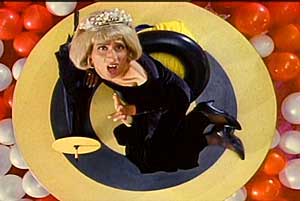 Another
theme involves visibility. It was often written that AIDS made gays visible
to the world at large. This is symbolized here when Zero's ghost speaks
with HIV (Michael Callan) and then becomes visible after being splashed
with the virus through a microscope's eyepiece. Meanwhile, one of Zero's
former lovers is going blind after getting no results from the most expensive
AIDS drug on the market. This drug, by the way, is a cash cow for Gilbert
& Sullivan Pharmaceuticals - who is also sponsoring Burton's "Hall
of Contagion" exhibit. Another
theme involves visibility. It was often written that AIDS made gays visible
to the world at large. This is symbolized here when Zero's ghost speaks
with HIV (Michael Callan) and then becomes visible after being splashed
with the virus through a microscope's eyepiece. Meanwhile, one of Zero's
former lovers is going blind after getting no results from the most expensive
AIDS drug on the market. This drug, by the way, is a cash cow for Gilbert
& Sullivan Pharmaceuticals - who is also sponsoring Burton's "Hall
of Contagion" exhibit.
|
|
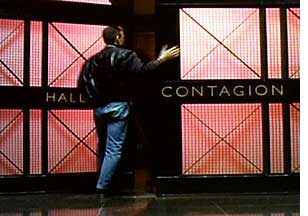 More
over the top than Lilies, Zero
Patience is another one-of-a-kind film from that tumultuous
birth period of the New Queer Cinema in the early 90s when the anger of
ACT UP erupted on the screen. Zero Patience
isn't perfect by any means. The camera is sometimes in totally the wrong
place during some of the musical numbers. The bad framing might be due
to the fact that this DVD is not letterboxed (shame shame) and we're not
seeing the entire image. But, obviously, the musical numbers do not have
the gloss of a Fred Astaire film - despite some clever choreography. You
also have to listen really closely at times to make out all the lyrics. More
over the top than Lilies, Zero
Patience is another one-of-a-kind film from that tumultuous
birth period of the New Queer Cinema in the early 90s when the anger of
ACT UP erupted on the screen. Zero Patience
isn't perfect by any means. The camera is sometimes in totally the wrong
place during some of the musical numbers. The bad framing might be due
to the fact that this DVD is not letterboxed (shame shame) and we're not
seeing the entire image. But, obviously, the musical numbers do not have
the gloss of a Fred Astaire film - despite some clever choreography. You
also have to listen really closely at times to make out all the lyrics.
|
|
 But
its charms far outweigh its flaws. The film is usually very funny. Burton
is a trip as he angers each of his interview subjects while trying to
prove that Patient Zero was a serial killer; when no one will give him
what he wants he takes their comments out of context, completely changing
the meaning. His humiliation, when he is later forced to seek out ACT
UP's endorsement of the exhibit, is priceless poetic justce. But even
ACT UP doesn't escape Grayson's pointed barbs when they arrive, Keystone
Kops-style, to sabotage Burton's Hall of Contagion. Finally, the uneasy
friendship between Burton and Zero is nicely developed; when they finally
kiss there are fullblown fireworks. But
its charms far outweigh its flaws. The film is usually very funny. Burton
is a trip as he angers each of his interview subjects while trying to
prove that Patient Zero was a serial killer; when no one will give him
what he wants he takes their comments out of context, completely changing
the meaning. His humiliation, when he is later forced to seek out ACT
UP's endorsement of the exhibit, is priceless poetic justce. But even
ACT UP doesn't escape Grayson's pointed barbs when they arrive, Keystone
Kops-style, to sabotage Burton's Hall of Contagion. Finally, the uneasy
friendship between Burton and Zero is nicely developed; when they finally
kiss there are fullblown fireworks.
This is a film whose
reputation I have known for years. I wish I had seen it on its first release
as I am sure it would have hit me on a more visceral level. Still, despite
its flaws - and also knowing that it would have been much more shocking
over a decade ago - this is a remarkable film. Warts and all, Zero
Patience should be seen by anyone with an interest in our
cinematic history. Love it or hate it, you won't say "been there done
that."
More
On John Grayson
Lilies
Proteus
|

